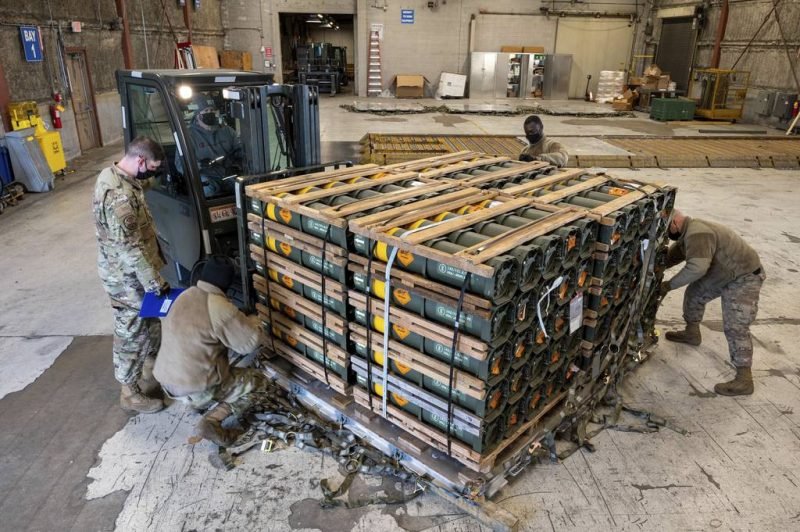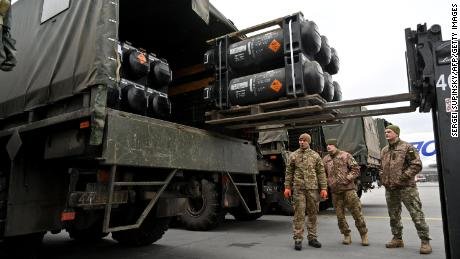West vows more arms, sanctions over new Russian offensive

Western allies on Tuesday pledged more military supplies and sanctions to assist Ukraine as its troops battle against Russian forces intensifying their offensive in the east of the country.
Ukraine’s armed forces said fighting had increased throughout Donbas, and the ministry of defence reported heavy clashes including near the town of Marinka in the Donetsk region.
Responding to the new Russian push, the United States and European Union agreed to increase “Moscow’s international isolation”, during a virtual meeting between US President Joe Biden and European leaders on Tuesday.
“We will further tighten our sanctions against Russia and step up financial and security assistance for Ukraine,” European Commission chief Ursula von der Leyen wrote on Twitter.
Russia’s defence ministry said that “high-precision air-based missiles” had hit 13 Ukrainian positions in parts of Donbas while other air strikes “hit 60 military assets”, including in towns close to the eastern frontline.
Biden suggested Tuesday to reporters that the United States would send more artillery — as the latest $800 million US aid package starts to arrive in Ukraine, including 18 howitzers, 40,000 artillery rounds, 200 armored personnel carriers and 11 helicopters.
“We will continue to provide them more ammunition as we will provide them more military assistance,” White House spokeswoman Jen Psaki said in response to fears that Ukraine was running low.
More aircraft
The Pentagon said Tuesday that Ukraine had also recently received fighter planes and aircraft parts to bolster its air force, declining to specify the number of aircraft and their origin.
Ukrainian forces “have available to them more fixed-wing fighter aircraft than they did two weeks ago,” Pentagon spokesman John Kirby told reporters.
Kyiv has asked its Western partners to provide MiG-29s that its pilots already know how to fly, and which a handful of Eastern European countries have.
On Tuesday evening, the Ukrainian defence ministry reported its troops had beaten back a Russian attack in the city of Izium, south of the partly blockaded second city of Kharkiv.
It also claimed enemy losses in a Ukrainian counter-attack near the town of Marinka in Donetsk.
In the eastern town of Novodruzhesk, resident Nadya, 65, said “we are bombed everywhere”.
“It’s a miracle that we’re still alive,” she said, her voice trembling. “We were lying on the ground and waiting. Since February 24 we’ve been sleeping in the cellar.”
Control of Donbas and the besieged southern port of Mariupol would allow Moscow to create a southern corridor to the Crimean peninsula that it annexed in 2014, and deprive Ukraine of much of its coastline and a major revenue resource.
In its relentless battle to capture Mariupol, Moscow issued a fresh call for the city’s defenders to surrender and announced the opening of a humanitarian corridor for any Ukrainian troops who agreed to lay down their arms.
But during an interview broadcast on CNN Tuesday, Pavlo Kyrylenko — who oversees the Donetsk region’s military administration — said Mariupol remained contested.
“The Ukrainian flag is flying over the city,” he said.

Heavy fighting
President Vladimir Putin has said he launched the so-called military operation in Ukraine in February to save Russian speakers in the country from a “genocide” carried out by a “neo-Nazi” regime.
British Prime Minister Boris Johnson said Moscow’s new advance on the east after failing to take the capital Kyiv “underscored the critical need for further military support,” his spokesperson said.
The regional governor of the eastern Lugansk region Sergiy Gaiday said Ukrainian forces continued to hold their ground amid heavy fighting.
“We have positional battles in the cities of Rubizhne and Popasna. The enemy cannot do anything though. They are losing people and equipment there,” Gaiday said.
“Our guys are shooting down drones there. Shooting down planes on the border of the Lugansk and Kharkiv regions, so they are holding on,” he added.
UN Secretary-General Antonio Guterres denounced Russia’s ongoing offensive as he issued calls for a four-day truce to mark Orthodox Holy Week.
“Instead of a celebration of new life, this Easter coincides with a Russian offensive in eastern Ukraine,” Guterres told reporters.
“The intense concentration of forces and firepower makes this battle inevitably more violent, bloody and destructive,” he said, calling for a “humanitarian pause” from Holy Thursday until Easter Sunday on April 24.
As fighting raged, the International Monetary Fund (IMF) published a grim forecast for the warring nations, while also predicting the conflict would drag down the global economy — hitting poorest nations the hardest.
The report predicted Ukraine would suffer a 35 percent collapse of its economy this year, while Russia’s GDP would drop 8.5 percent — more than 11 points below the pre-war expectations.


















